Incredible workload of Gold Coast ambos revealed
Under-pressure ambulance paramedics are on life support and resorting to extreme measures to keep up with emergencies. Read about their plight in our special report.
Gold Coast
Don't miss out on the headlines from Gold Coast. Followed categories will be added to My News.
Ambulance staff on the Gold Coast say they are being stretched to the limit – working overtime on most shifts, unable to take meal breaks and sometimes struggling to even find time to use the toilet.
However bosses say everything possible is being done to support staff and help them to finish their shifts on time, while more paramedics than ever have been employed in the city.
Accounts from ambos and their representatives paint a picture of challenging working conditions on the Gold Coast as the service battles to replace hours lost waiting at emergency departments.
Queensland Ambulance Service (QAS) paramedics have reported being asked to do overtime on “the majority” of shifts – already scheduled to last 10 to 12 hours – as they cope with an average of 355 call-outs a day and ramping of up to four and a half hours.
Fiona Scalon, who is National Ambulance Coordinator for the United Workers Union (UWU), said the workload of members on the Gold Coast was so high that ambulance officers were sometimes reduced to tears when their shifts were extended.
“Having a shift extension – that is, working past your rostered finish time – is happening more and more frequently on the Gold Coast,” Ms Scalon said.
“Paramedics are frequently sent to cases within the last 15 minutes of their shift, or even after their rostered finish time, which results in over an hour of overtime, often without having either of their two 30-minute breaks during the shift.
“ … UWU has a lot of members who say they no longer plan any kind of social or family event after work as they know they will most likely not make it.
“The union has members who say that they can go a few days without seeing their kids because of shift extensions. This is the biggest contributor to burnout, fatigue and anxiety in our workforce.
“UWU has heard of members in tears at the thought of getting another job and resultant shift extension when they are mere minutes away from their rostered finish time, because they know a late job costs them their time between shifts to decompress.”
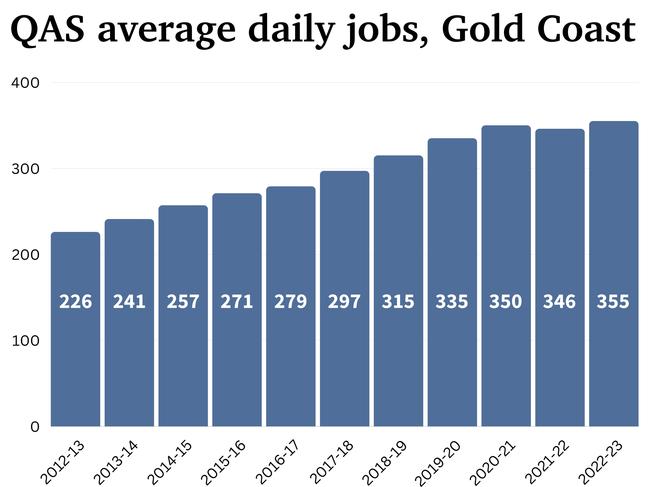
The amount of overtime and missed meal breaks is reflected in the huge sums being paid out by taxpayers, with just over $7 million paid in the 2021-22 financial year in allowances to Gold Coast paramedics triggered when a worker can’t take a break.
“(Missed meal breaks) occurs almost every shift, and is far more common at night,” Ms Scalon said.
“Our members are expected to drive and treat patients all night with fewer ambulances and paramedics without the ability to have an appropriate break from duty.
“It is not uncommon to hear over the radio at night a crew asking permission if they can pull over on the way to their next case to use a public toilet for relief or a servo coffee to manage their fatigue.”
In the 2022-23 financial year QAS paramedics responded to an average of 355 incidents a day – about 50 per cent more than they were dealing with 10 years ago.
However there has been no significant increase in demand in the last three years, with Ms Scalon saying the real issue was ramping at hospitals.
“Demand hasn’t actually increased in any significant way. The time lost at hospital waiting to transfer the care of patients is what has the greatest impact,” Ms Scalon said.
“The Queensland Ambulance Service (QAS) loses 500 hours a day across Queensland to ambulance ramping which would otherwise be ambulances responding in the community.”
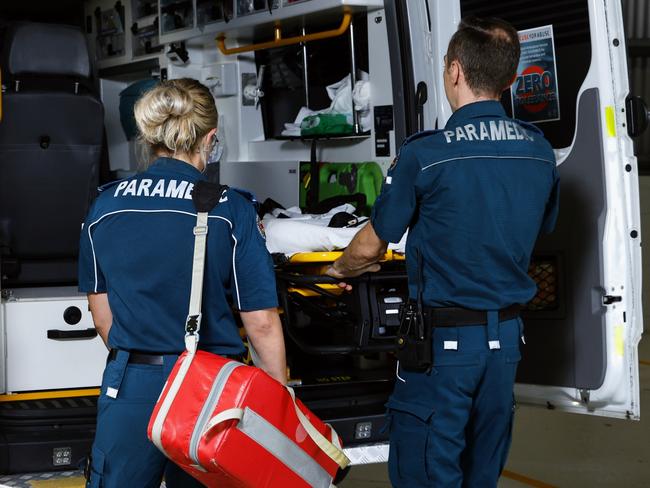
DEMAND FOR JOBS
Despite the pressure on its workforce, the QAS is unable to offer permanent positions on the Gold Coast to many highly trained paramedics who want them.
In submissions to a recent Queensland Industrial Relations Commission (QIRC) hearing, QAS admitted that demand for permanent positions in the Gold Coast region was “extremely high”, but many eligible candidates waited years to secure the roles.
“QAS says 39 employees have applied or have been identified as being eligible for consideration of casual conversion on the Gold Coast since 1 March 2023,” a QIRC judgment delivered on August 28 stated.
“ … Internal demand for permanent positions in the Gold Coast Region is extremely high”.
The judgment also revealed that there was a “waiting list” of paramedics working in other parts of Queensland who were anxious to move to the city.
“At the time of writing the submissions, QAS says that there are 49 employees external to the region waiting for a transfer to a permanent position within the Gold Coast Region and 10 of those employees have waited for five years or more after serving their agreed time in a regional position”.
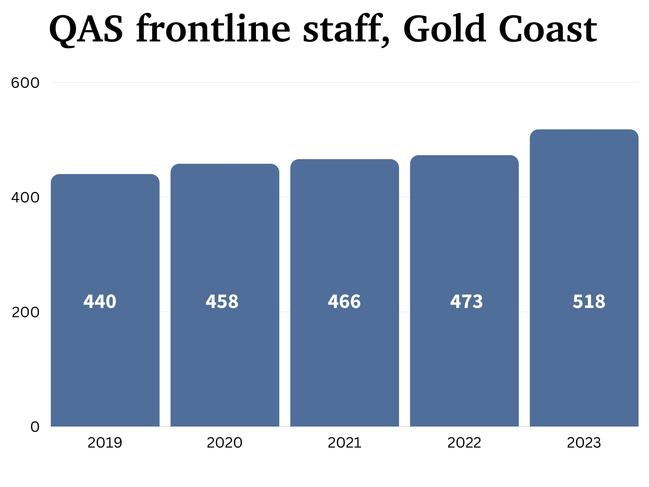
The revelations came after an experienced Gold Coast paramedic challenged a decision to deny her a permanent position in the city.
The paramedic had worked since March 2020 in a series of casual or temporary roles at stations in Mermaid Waters, Southport, Nerang and Pimpama stations.
Her request for a permanent position was denied, with QAS saying it could only offer her permanent roles in Townsville, Central Queensland and Mackay, or on “twilight rosters” in the Metro North and Metro South Districts.
That was despite what the QIRC heard was a “clear need” for more staff on the Gold Coast.
“(She) submits that the Gold Coast region ‘clearly has an operational need for further staffing’ and this can be seen in ‘evident increases in overtime messages, single officer responses to jobs, excessive ramping at hospitals, missed meals on the majority of shifts, and overtime carried out on the majority of shifts’,” the judgment stated.
The paramedic’s appeal was denied.
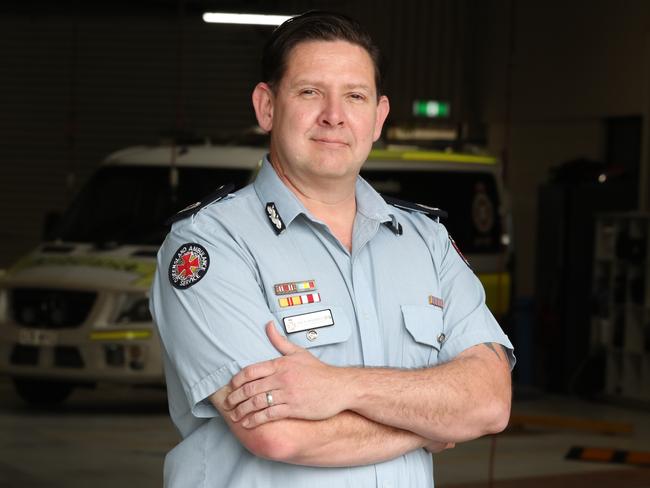
THE QAS RESPONSE
The number of full-time frontline QAS staff on the Gold Coast – which includes paramedics, patient transport, emergency medical dispatchers and supervisors – has been steadily rising in the past five years, from 440 five years ago to 518 today. Of those just over eight per cent are temporary or casual positions.
Among them are 17 staff working at a new station which opened recently in Ormeau.
QAS Assistant Commissioner Drew Hebbron, who heads the service on the Gold Coast, said his staff work “really hard” and “there are days when we ask a lot of them”.
However he denied that staff were struggling to the extent claimed.
“We do ask our staff to sometimes work a reasonable amount of overtime when required, but we do have a lot of strategies in place, particularly at the moment, to help them finish on time,” he said.
“We’ve placed extra supervision down at the ramps. That’s been very much in keeping with the feedback we’ve had from our staff, which is that they want to finish on time. So we’ve very much stepped up into that space to provide more support.
“ … We’ve also had a push on trying to provide breaks for our staff as well. That’s done in a really consultative way with our staff.
“And they get access to bathroom facilities both at station and at hospitals and they access those when they need to.”
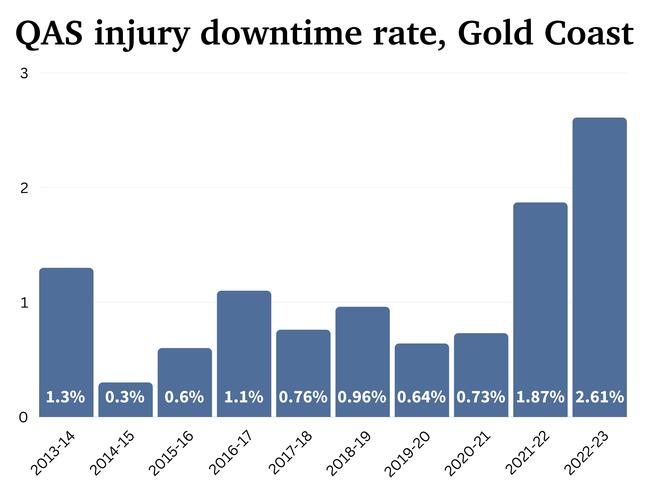
Asked about reports of staff going days without seeing their children, Mr Hebbron said it “can happen in any profession”, and QAS did its “level best” to provide flexible work arrangements.
“We have to balance that with the fact that we’re a 24/7 emergency service delivery service agency and we’ve got an obligation to meet our commitment to provide an ambulance service to the community,” he said.
“It’s a balancing act. But we certainly try our hardest for them, because these are hard working men and women and we value them.”
He added that the Gold Coast “one of the most popular places to work in QAS”, but the organisation had an obligation to ensure the entire state was properly serviced.
“It’s a really complex situation,” he said. “The list of people wanting to transfer into the Gold Coast has been as high as 70 in recent times.
“When we are trying to bring people into the organisation and to staff our different stations we obviously don’t think in isolation of the Gold Coast. We’re a big service with stations everywhere.”
TIME LOST
Statistics for the first quarter of this year showed the average off stretcher wait time was 13 minutes at Robina and 17 minutes at Gold Coast University Hospital (GCUH).
However there were some occasions when the hold-ups were significantly longer, with the worst recorded in that period being a four hour, 33 minute wait at GCUH.
Mr Hebbron said lost time at hospitals did “impact our service delivery and resource availability”, but said QAS had placed “extra supervision on the ramps” and praised the work of hospital staff to minimise the problem.
“We’ve got a really good relationship with the Gold Coast Hospital and Health Service. We’re in constant contact with them pretty much every day.
“ … The GCUH actually does very well in their patient flow initiatives. We’ve got a very collaborative and very successful model set up with them.
“ … Our lost time on the Gold Coast, compared to some other places, it’s actually very good.”
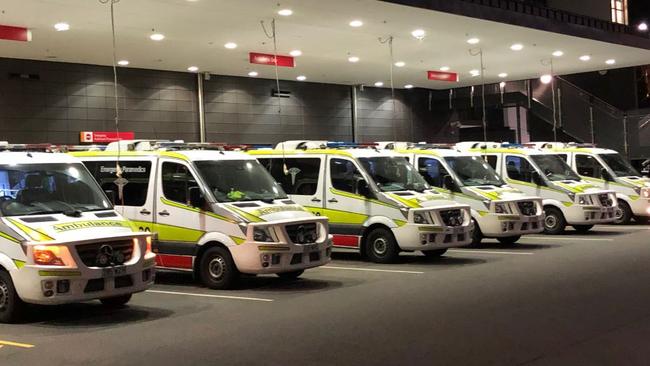
More time is also being lost to workplace injury – mental as well as physical – among QAS staff on the Gold Coast.
In just two years the percentage of hours lost has jumped from 0.73 to 2.61 per cent.
“We’ve had some really challenging jobs in the last 12 months,” Mr Hebbron said. “ … That really just takes it out of you.
“So that’s where we have some really good staff support mechanisms in place, to check in on our staff.
“ … I go out and do ride-alongs every now and then and try and talk to staff as much as I can.
“They just do a phenomenal job every single day and the care that they show the community is something that I’m very proud of, I know that the organisation’s very proud of and I think the community should be very proud and grateful for.”




